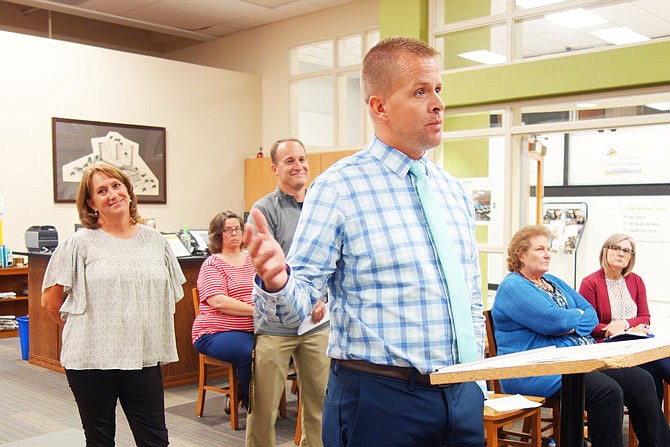Students are talking about it in the halls.
The question on their lips: "Are you on the list?"
"The list" might sound ominous, but it's actually a new initiative at Fulton High School to make sure students complete important homework. On Sept. 4, the school introduced a homework-tracking software called Academic Intensive Care.
"In just over a month, we've recovered over 1,200 assignments," Principal Chris Mincher said.
Here's how it works: Teachers identify homework assignments that are especially vital for students to complete - ones that teach important curriculum standards. Those assignments are entered into the software's database. If 24 hours pass after the assignment's due, the system notifies the student's parents.
It also tips off study skills teacher Joel Henley and librarian Sara DeFily. They pull students out of electives once a day until the homework assignment is complete. Pulled students spend the hour working on homework in a room nicknamed the Intensive Care Unit.
"Usually, electives are the classes students think are more interesting, for better or worse," DeFily said. "That's the carrot we dangle."
They do make sure not to pull students from the same class twice in a row.
All teachers at the school have access to the list of students who need to complete assignments, so students may get multiple reminders throughout the day.
"Their parents, their teachers, me, Joel - everyone's beeping at this kid to get the work done," DeFily said.
Currently, only freshmen are having their assignments tracked and being pulled from classes.
"This helps get these habits instilled before their sophomore year," Mincher said.
Mincher, DeFily and Henley are still deciding on a strategy for students who regularly fail to turn in homework, nicknamed "frequent fliers." Henley assembled a list of about a dozen students who seem to be having trouble.
"They're not bad kids," he said. "They're kids who have all kinds of issues going on."
The goal isn't to embarrass students - it's to build those habits and also keep the students from failing classes. During the 2017-18 school year, freshmen failed 5.2 percent of the classes attempted, failing to meet the 5 percent or lower goal set by administrators. While teachers may take points off for late assignments, (there's not yet a uniform policy) students receiving partial credit and an understanding of the lesson is better for them than simply flunking the assignment.
"There is the possibility to add sophomores next year," said Karen Snethen, Fulton Public Schools' community relations person. "The program will be evaluated and the determination made as to whether it will be useful to expand or not once data is obtained from this semester."
Fulton High School administrators decided to give the software a shot after hearing rave reviews at St. Clair High School. So far, feedback from parents has been largely positive. Todd Gray, an FPS Board of Education member and parent to a freshman, is a fan.
"I appreciate it," he said. "She's had two (late assignments) so far, and she knows she's not allowed to have another."

